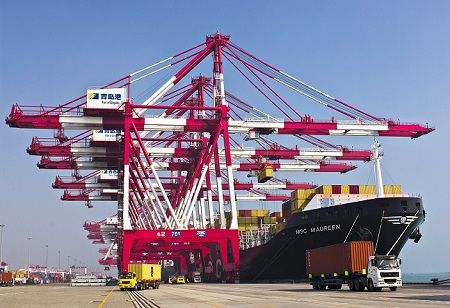Giant cargo ships continuously arrive and depart at Qingdao Port, where containers are efficiently loaded and unloaded. This bustling port also serves as a hands-on training ground for students from Qingdao Harbor Vocational and Technical College. Located in east China's Shandong Province, the college has produced over 70,000 skilled graduates for the nation's port and shipping industry since its founding 49 years ago.
This success is largely due to the college's innovative teaching approach of "bringing the classroom to the port". To develop highly skilled professionals for the nation's industrial modernization efforts, China has increasingly focused on integrating vocational education with corporate and industry development in recent years. In a pivotal Party resolution adopted last month, building a vocational education system that is well-integrated with industry was once again emphasized. Currently, there are over 11,000 vocational institutions in China.
Xing Hui, head of the Vocational Education Research Center at the National Academy of Education Administration, stated that encouraging enterprises to be involved in every aspect of vocational education helps align teaching with industry needs and supports the growth of a modern industrial system.
In the course of its development, Qingdao Harbor Vocational and Technical College has been taking advantage of both its location in the Lingshan Bay area of the Shandong Peninsula and its cooperation with port management companies. Video signals of production and maritime radar signals from Qingdao Port are connected to the teaching area, allowing students to understand the port operation processes while on campus, said Gao Juan, a teacher specializing in port machinery and intelligent control at the college.
"Graduates from the college can be found at major coastal and riverside ports across the country", said Chen Jiwei, vice president of the college. Among the 298 employees at Qingdao Port's automated terminal, over 62 percent are graduates of this college.
Corporations also serve as teacher pools for vocational schools. The college has signed 179 model engineers and master craftsmen to lecture at least 40 hours a year. More than 90 percent of the port and shipping majors teachers at the college have practical working experience in the field. Vocational education plays an increasingly prominent role in serving the upgrading of China's traditional industries and fostering new quality productive forces.
China's vocational education system produces around 10 million highly skilled technical workers annually. In sectors such as modern manufacturing, strategic emerging industries, and modern services, over 70 percent of newly hired on-site employees are graduates of vocational colleges.
Situated in Deyang, a key equipment manufacturing hub in southwest China's Sichuan Province, Sichuan Polytechnic University has established partnerships with prominent companies like Erzhong (Deyang) Heavy Equipment Co., Ltd. and Dongfang Electric Corporation, both part of the city's manufacturing enterprise cluster. "Compared to scientific research in universities, innovation in vocational schools develops frontline technologies for new quality productive forces", said Chen Xiaoci, who heads a lab at the university that boasts more than 20 patents since its establishment in 2019.

